Write Us
We are just a call away
[ LET’S TALK AI ]
X
Discover AI-
Powered Solutions
Get ready to explore cutting-edge AI technologies that can transform your workflow!


The travel industry within Saudi Arabia is experiencing a significant change. The main reason for this shift is the creation of the most innovative artificial intelligence (AI) applications. To ensure that the Kingdom continues to expand its economy and improve travel, software app development companies are using AI to build innovative solutions that change how travelers book, plan, and experience their travels.
This blog will discuss how the government initiated the Vision 2030 program. The most effective AI applications are revolutionizing the tourism industry in Saudi Arabia, delving into the most cutting-edge techniques, innovative features, and innovative businesses that are at the forefront of the digital revolution.
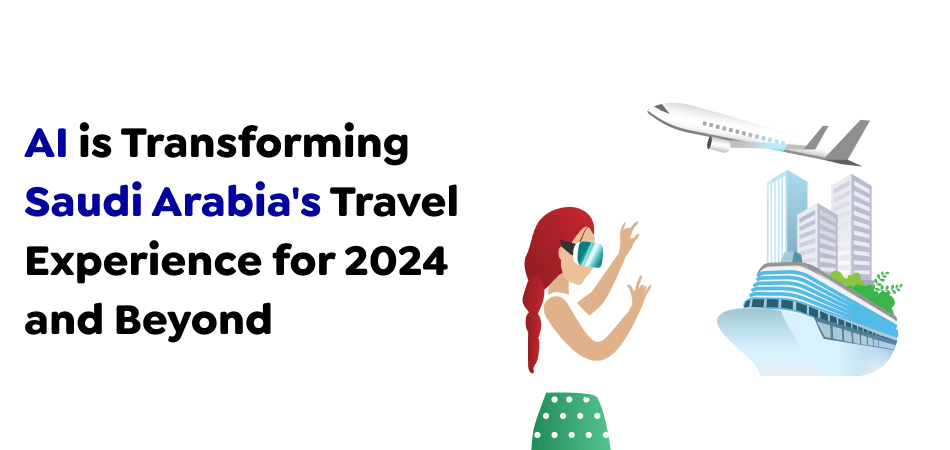
Saudi Arabia has long recognized AI’s potential and invested substantial sums to help nurture the flourishing technology ecosystem. Dubai’s Vision 2030 initiative has prioritized encouraging technological innovation in entrepreneurship, digital transformation, and innovation and has opened the way for local companies developing an app to grow.
Businesses have adopted AI as a helpful method of improving travel experiences by providing personalized advice, immediate assistance, and seamless integration of all aspects of travel. Machine learning algorithms, natural language processing, and computers with imaging and AI applications are changing every aspect of travel, from the planning and booking process to the post-trip experience in destination and reflections.
Also Read : Almatar App Ranked 3rd in Most Downloaded Travel Apps in Saudi Arabia
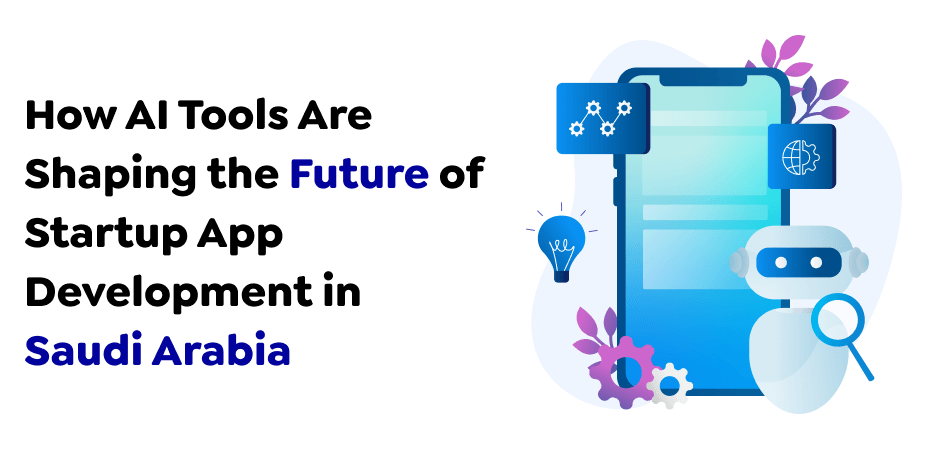
Startups have always had to deal with challenges like inadequate resources and a lack of expertise, which makes it difficult to build top-quality applications. However, the advent of artificial intelligence devices has altered how businesses approach developing apps. AI tools can cut costs, speed up development, and create more efficient and practical applications. Let’s examine startups’ latest developments, why they’re more profitable than traditional methods, and the tools being utilized.
Before introducing AI, new business owners had to commit a considerable amount of time and money to developing their apps, bringing on expensive developers or outsourcing work to third-party firms. The process was lengthy, costly, and inefficient, which made startups unable to compete in the marketplace. Furthermore, traditional development was usually labor-intensive, requiring teams composed of programmers to create complicated code and test it.
With the introduction of AI tools, app developers can now access automated solutions for mobile app development in Saudi Arabia that will streamline the process, cut expenses, and boost efficiency. AI can help you automate software development, test applications, and spot bugs, decreasing the burden on developers and making the process faster. In addition, AI-assisted software allows entrepreneurs to develop more precise and efficient apps by studying the user’s behavior and data.
A brief overview of AI App Development Tools Being employed by Startups
Instruments like the natural process of language (NLP), machine learning (ML), and chatbot frameworks are incorporated into this procedure. These tools let startups create more efficient and precise intelligent chatbots, software for translating languages, and Voice assistants.
For instance, companies like Google and IBM provide AI-powered APIs, allowing developers to incorporate NLP or ML features into their applications. Companies such as Microsoft and Amazon also offer chatbot frameworks that are easily integrated into existing applications.
Significant reductions in costs, speed improvement of development, and more applications fall under the numerous benefits AI offers new businesses. Developing more personalized, precise, and user-friendly products is now possible. This could result in increased customer satisfaction and generate revenue. In addition, this technology can give insight into the behavior of users, which allows new companies to enhance their products and their overall business plan.
Also Read : How Much Will Mobile App Development Cost in 2025?
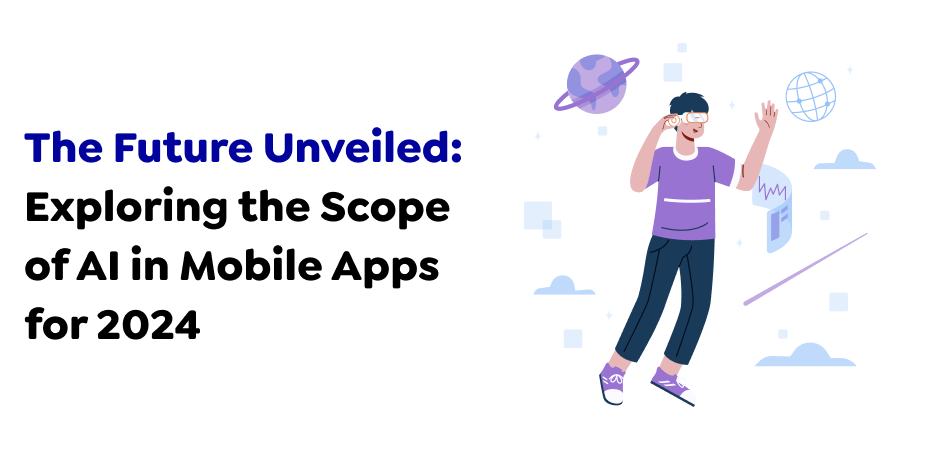
AI is predicted to increase exponentially in mobile applications as we approach 2024. Technological advancements, a growing need for smart software, and the widespread adoption of AI across various industries drive this. Here are some key areas in which AI is expected to impact significantly.
Conversational Artificial Intelligence (AI) and Natural Language Processing: Conversational Artificial Intelligence (AI) and natural language processing are expected to become more advanced. This will facilitate seamless conversations with voice and smart digital assistants, as well as multilingual support in mobile applications. This will alter the way that users engage with mobile phones, making it more user-friendly and natural.
Computer Vision (AR): Artificial Intelligence-powered computer vision and AR can transform the market for mobile apps by enabling intelligent object detection and a variety of Augmented Reality. AI will change the way we interact with digital environments on mobile devices, from virtual experience-based experiences and interactive gaming to improved navigation, visual search, and navigation capabilities.
Decision Support Feature and Predictive Analytics: AI will use its capability to analyze large quantities of data, find patterns, and provide intelligent decision support for mobile apps. This will enable intelligent decision-making and personalized advice across various sectors, including finance and healthcare.
Internet of Things and Edge Computing: The integration of AI Edge Computing and AI together with IoT or mobile gadgets will allow for the real-time processing of data and smart decisions to be made. This technology can be used for industrial automation, smart homes, and intelligent transportation systems, each requiring development.
Context-Awareness: AI can enhance personalization in mobile apps, providing truly customized user experiences dependent on user preferences, behavior patterns, and geography. This will create more engaging and relevant mobile experiences in various fields, such as entertainment apps, productivity apps and ecommerce apps in Saudi Arabia.
Ethics AI and Privacy: As AI becomes more commonplace in mobile apps, the focus will shift towards ethical AI practices, privacy, and responsible use of personal data. Ecommerce app development company from Riyadh and other companies should prioritize transparency, user controls, and strict privacy and security guidelines.
AIaaS: AIaaS platforms are making it easier to access AI capabilities. They permit developers and corporations of all sizes to incorporate advanced AI capabilities into mobile apps without requiring massive skills or resources.
Saudi Arabia is embracing digital transformation and innovation. Incorporating AI in mobile applications is a significant element in driving economic growth and improving the quality of life. Businesses can utilize AI to gain a competitive advantage, offer fantastic user experiences, and open new opportunities in the ever-changing mobile environment.
Also Read : How AI is Revolutionizing Taxi Booking App Development: Benefits, Features, and Future Prospects
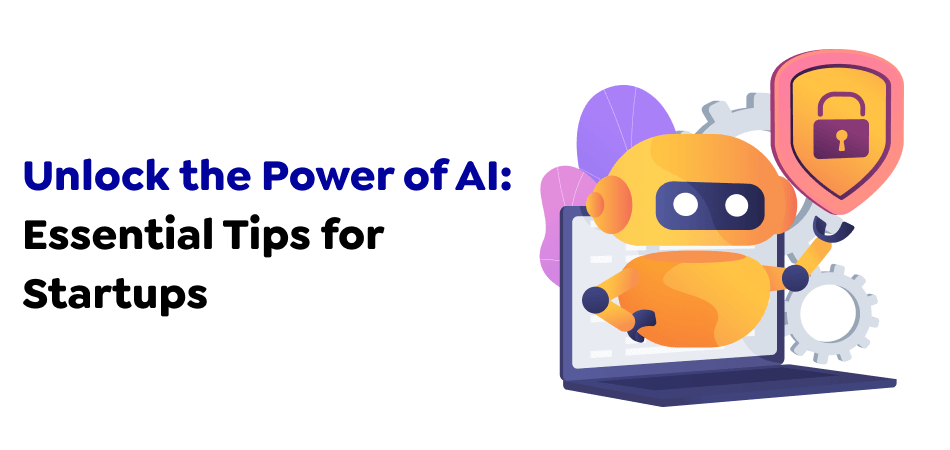
Incorporating AI into your processes will help startups remain ahead of the pack. AI can streamline processes, cut costs, and enhance customer experience. Yet, AI integration can be complicated. Here are some guidelines for integrating AI.
Before integrating AI into your work, it is essential to study the available tools. This will guide you in determining which ones are the most suitable for your needs. Here are a few points to keep in mind when doing your research:
Before incorporating AI into your project, being familiar with the available AI tools is essential. Being familiar with them will aid you in identifying which AI tools are most suitable for your needs. Here are some helpful tips to get started:
Once you’ve become acquainted with AI tools, the following step will be to determine which is most suitable for you. The ideal AI instrument for the particular project will be based on the specifics of your application and its requirements. Here are some guidelines to help you choose the most suitable AI tool:
Also Read : Step-by-Step Guide for Mobile App Development Process
Conversational and Chatbots Dialog Flow and IBM Watson Assistant are two very popular AI tools for creating chatbots and conversational interfaces. These tools benefit users by enabling companies to offer 24/7 customer support, reduce response times, and boost customer satisfaction.
Chatbots and other Conversational Interfaces: It can aid businesses in automating certain tasks, providing answers to frequently asked questions, and offering suggestions based on user input. Utilizing Dialog Flow and IBM Watson Assistant, businesses can quickly create and modify chatbots that meet their particular requirements.
Images and Video Recognition: Google Cloud Vision and Amazon Recognition are two AI tools that allow users to categorize and analyze videos and photos. These tools can be helpful for users as they assist businesses in automating specific processes, like tagging and organizing extensive collections of videos or images. They can also locate objects, people, or other objects in videos or images, which can be beneficial in security and content moderation or even for marketing campaigns.
Predictive Analytics: RapidMiner and DataRobot are AI tools that aid businesses in making predictions using data. These tools can benefit users as they assist companies in identifying patterns and trends within data, forecasting future outcomes, and making informed decisions. Predictive analytics are utilized in many industries, including healthcare, finance, and marketing, to assist businesses in making better decisions and improving their processes.
Vocal Recognition: Amazon Alexa and Google Assistant are two well-known AI tools for creating the ability to recognize voices. These tools can be helpful for users since they permit businesses to design voice-enabled devices that can comprehend and respond to user-generated commands. The voice recognition technology can automate tasks like turning on lights or changing the temperature. It can also be coupled with different AI tools, like chatbots, to offer users a seamless experience.
Personalization: Adobe Target and Salesforce Einstein are two AI tools that allow businesses to provide personal experiences to customers. These tools benefit users by permitting firms to study customer information and develop targeted marketing automation campaigns or personal product suggestions.
Personalization is a way for businesses to increase customer engagement and loyalty and eventually increase sales.
In the end, these AI tools can prove helpful to businesses that want to improve their operations, improve their customer service, and remain relevant in the current market. Through these tools, companies can automate certain tasks, make data-driven choices, and offer more customized experiences for their customers.
Although AI offers many advantages in this area, there are some potential hazards to be aware of, including:
Also Read : What is Apache Cordova? Exploring its Impact on Mobile App Development
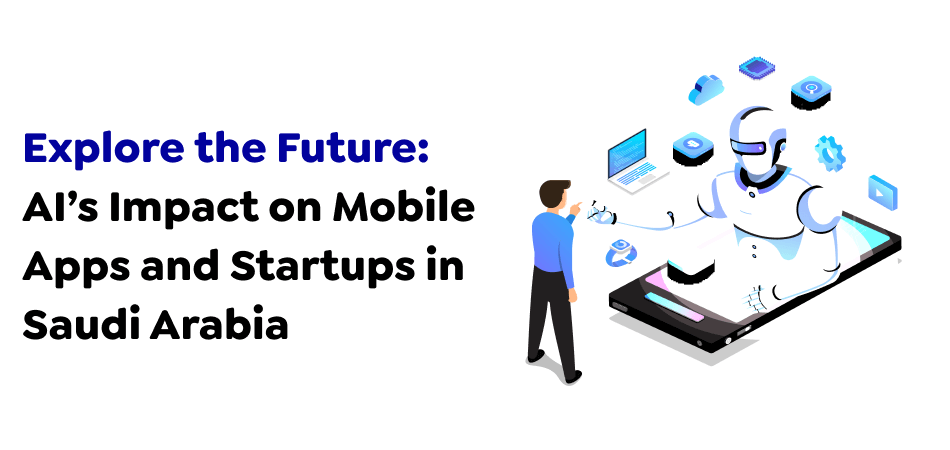
With the advancement of mobile apps, artificial Intelligence opens up a new world of possibilities. Apps that use AI can have capabilities ranging from voice and image recognition to the ability of predictive analytics and much more. Here are a few of them:
Future AI applications will depend heavily on image and object recognition. Advanced functions such as object and image recognition will be included in mobile applications.
A computer vision method known as image recognition can help identify and categorize different kinds of words, objects, and other behaviors in digital images. One of the most significant image recognition applications is medical imaging, which uses computer vision to identify photo patterns and irregularities.
In addition, AI-based applications for object identification include barcode scanning, the identification of objects in a photograph, and virtual real-world graphics generation.
Voice recognition technology can recognize speech in a variety of languages. Developers mainly use it to improve the security and safety of their applications. Two of the most effective applications of this tech are Alexa or Siri.
With the advancements in speech recognition technology, mobile apps can understand and respond to your spoken instructions. Ultimately, this new update makes your interactions much more natural and effective.
Additionally, gesture detection technology enhances user interfaces and allows apps to communicate with users through their motions. Driving and cooking are two instances where this could help.
By analyzing user data such as preference, history, location, and interactions with the mobile application, AI algorithms can create customized content, suggest products and offers, and provide the actions of users. In turn, this increases user engagement and satisfaction, which encourages users to use the app for longer.
Music streaming apps are a good example. It will use a custom playlist to create a personalized playlist based on the user’s preferences and listening habits.
Integrated with AR and VR, it delivers extremely realistic and thrilling experiences we could not imagine just a few years ago. You can also create personalized news articles, fun video games, and many other applications.
Predictive analytics allow companies to better assess their performance, gain valuable data, and improve service quality. However, with AI, it is possible to go one step further. Advanced AI systems can indeed assist in predicting users’ behavior, preferences, and desires. Additionally, you will get demand forecasts, data about process weaknesses, and other tools for increasing efficiency and productivity.
In predictive analytics, previous records are used to forecast future events using mathematical calculations and smart computer programs. This is beneficial when creating mobile applications since it helps identify what users might like or expect, which can result in an enhanced experience.
Quick and efficient customer service is essential today. Because the market is competitive, you must respond to customers’ questions uniquely. Responding to many questions requires a lot of time and money.
AI-powered chatbots can assist in this regard. Utilizing NLP capabilities, they can respond to user inquiries. Additionally, chatbots with expertise will first analyze the user’s question, determine a suitable answer, and then display it to the user. App developers utilize AI chatbots for mobile development. They can simplify customer service across different industries and help reduce operating expenses.
Also Read : Ride Sharing App Development: A Gateway to Enhance Travel & Tourism Industry
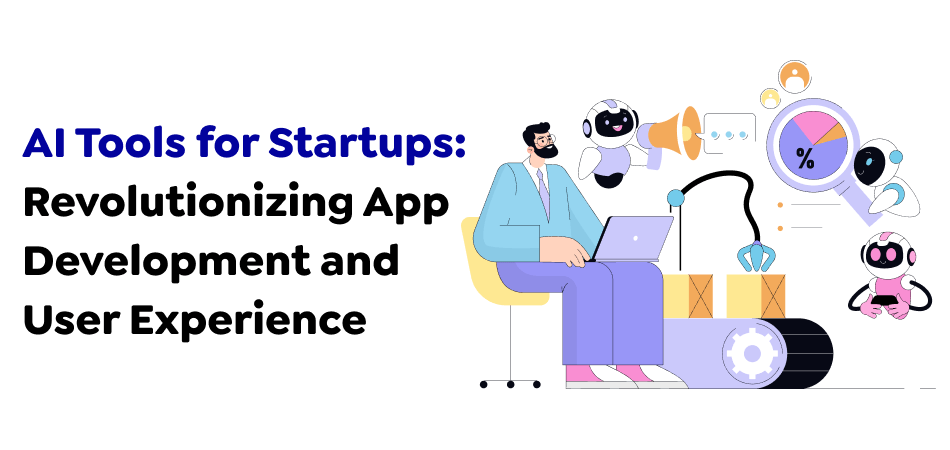
There are many options for integrating AI into mobile applications. We’ve only listed the most well-known AI development tools that can improve mobile application efficiency.
Apple designed the top AI application development tool, Core ML, to enhance users’ privacy. It comes with powerful machine-learning tools, advanced functionality, and a drag-and-drop interface to allow you to develop smart iOS mobile applications. It can comprehend speech, pictures, and gestures, translate and classify text, and analyze sound.
TensorFlow is an open-source AI tool based on deep-learning neural networks. It combines deep learning and machine learning in tandem. The software is based on Python and produces apps that work with web browsers, on drives, and other browsers. This gives developers flexibility. It makes tasks such as picture classification, language translation, and speech recognition a lot easier.
The flexible, scalable, and light deep learning framework Caffe2 allows programmers greater freedom to design and create innovative applications that perform well. Programmers can build artificial neural networks (ANNs) using the same machine, which can process more than 60 million photos each day. Its capabilities comprise image tempering, object detection, and mathematical calculations.
ML Kit is a mobile SDK that lets programmers create sophisticated iOS and Android applications using the simplest method. The Google app development tool is available for free, and its machine learning capabilities and features save the information collected on the device. It allows barcode scanning, text, face digital ink, real-time tracking, and object recognition.
With a myriad of options, selecting the most suitable AI framework is a daunting task. Each tool has advantages and drawbacks. Choosing one is based on your specific needs, the type of AI model that you’re planning to build, the language used to code it, and the processing power available.
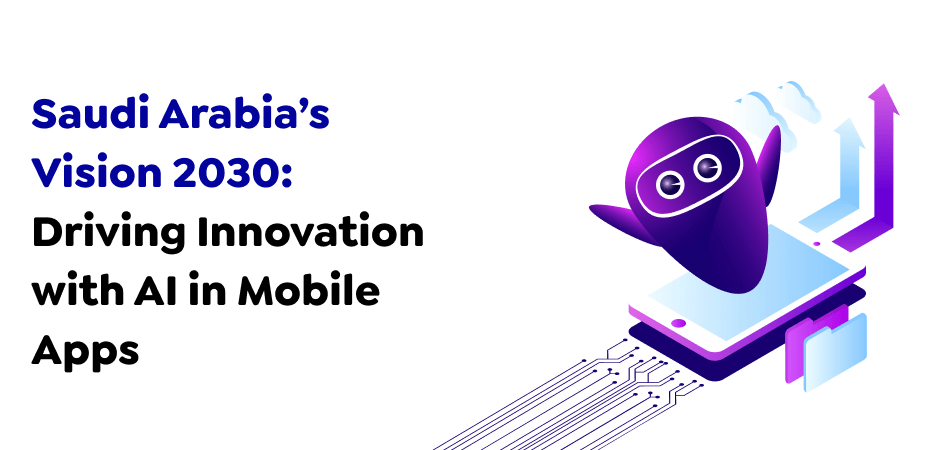
Incorporating Artificial Intelligence into the Vision 2030 for mobile applications will transform industries in Saudi Arabia and redefine the user experience. Saudi Arabia’s commitment to technological innovation and digital transformation will position it as a pioneer in taking on AI.
AI-powered applications will transform many areas. From Saudi Arabia smart city administration to customized financial services, intelligent health solutions, and immersive entertainment, AI-powered apps will enhance living conditions and quality and boost economic growth.
We are a top mobile app development company in Saudi Arabia. We strive to remain at the forefront of AI advancements and empower companies to harness the potential of this revolutionary latest technology. We want to provide businesses in Saudi Arabia with cutting-edge solutions and our knowledge so that they can master the complexities of AI integration and offer a seamless mobile experience. AI will be the mainstay of mobile applications in the near future. Saudi Arabia’s embrace of AI is proof of its desire to be an advanced, technologically savvy, intelligent society. Businesses can utilize AI to achieve competitive advantages, provide superior user experiences, and discover new opportunities in the constantly changing mobile world.
Saudi Arabia’s dedication and acceptance of cutting-edge technology position the country as a leader in the region. When we begin our exciting journey to an AI-driven society, we can think of endless possibilities. So let’s begin by collaborating with a travel app development company.
Ready to innovate? Get in touch with Techugo and let’s bring your app ideas to life with cutting-edge AI solutions.
Write Us
sales@techugo.comOr fill this form